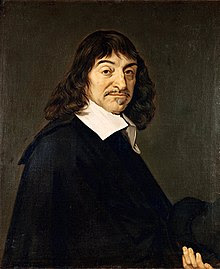The Most Influential Philosopher You've Never Heard Of: Unveiling the Hidden Gem of (René Descartes)
Forget Plato, forget Nietzsche, forget even the ever-popular Kant. Today, we're venturing beyond the well-trodden paths of philosophical giants to meet a thinker whose brilliance has long been obscured by the dust of time: (René Descartes).
Now, you might be thinking, "Another obscure philosopher? Haven't I heard enough about forgotten geniuses who never quite made it into the mainstream?" But trust me, (René Descartes) is different. This isn't just some dusty tome gathering cobwebs in a forgotten corner of the library. This is a mind that shook the very foundations of Descartes's work had a profound impact on the development of Western philosophy. His method of inquiry paved the way for the rise of modern empiricism and rationalism. His ideas about the nature of the mind and the body also had a significant influence on later philosophers, leaving ripples that continue to shape our world today.
So, who was this enigmatic figure, and why should you care? Buckle up, because we're about to embark on a philosophical odyssey that will have you questioning everything you thought you knew.
René Descartes: The Father of Modern Philosophy
Early Life and Education
Descartes
was born in La Haye en Touraine, France, on March 31, 1596. He was the youngest
of three children, and his father was a wealthy lawyer. Descartes' mother died
when he was just one year old, and he was raised by his grandmother.
At
the age of eight, Descartes was sent to the Collège La Flèche, a Jesuit school
in Anjou. There, he received a rigorous education in classical literature,
philosophy, and mathematics. After graduating from La Flèche, Descartes studied
law at the University of Poitiers. However, he soon became disillusioned with
the traditional Aristotelian philosophy that was taught at the university.
Military Service and the Development of His Philosophical Method
In
1618, Descartes joined the Dutch army. During his time in the military, he had
a series of dreams that led him to doubt everything he thought he knew about
the world. This experience prompted him to develop a new method of inquiry that
he believed would allow him to reach certain knowledge of the world.
Descartes's method of inquiry involved three steps:
1. Doubt: He began by doubting everything that he could possibly doubt. He even doubted the existence of the external world and his own body.
Cogito: The only thing that Descartes could not doubt was that he was thinking. This led him to his famous dictum, "Cogito, ergo sum," which means "I think, therefore I am."
3.
Clear and Distinct Ideas: Descartes believed that we can only have
certain knowledge of things that we can clearly and distinctly understand. He
argued that we can have clear and distinct ideas of our own minds, but not of
the external world.
Descartes's Philosophical Contributions
Descartes's
work had a profound impact on the development of Western philosophy. His method
of inquiry paved the way for the rise of modern empiricism and rationalism. His
ideas about the nature of the mind and the body also had a significant
influence on later philosophers.
In
addition to his work in philosophy, Descartes also made significant
contributions to mathematics and science. He developed analytic geometry, which
is a branch of mathematics that uses algebra to study geometry. He also made
important contributions to the fields of optics and meteorology.
Descartes's Death and Legacy
Descartes
died in Stockholm, Sweden, on February 11, 1650. He was 53 years old. Despite
his relatively short life, Descartes left a lasting legacy on Western thought.
His work continues to be studied and debated by philosophers, scientists, and
mathematicians today.
Descartes's Major Works
·
Discourse on the
Method of Thinking Clearly and Distinctly (1637)
·
Meditations on First
Philosophy (1641)
·
Principles of
Philosophy (1644)
·
The World or Treatise
on Light (1664)
Conclusion
René
Descartes was a brilliant and innovative thinker who made significant
contributions to philosophy, mathematics, and science. His work has had a
profound impact on Western thought, and his legacy continues to this day.
I hope this blog post has given you a brief overview The Most Influential Philosopher life and work of René Descartes.
